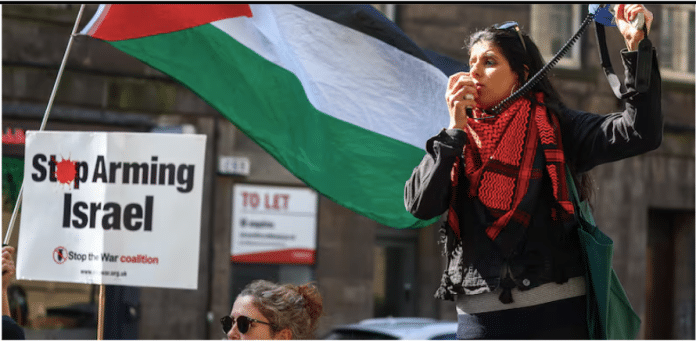Calls for an arms embargo on Israel have stepped up, 12 months after the war in Gaza broke out and as Israel widens its offensive against Iran-backed militants in the region.
French President Emmanuel Macron has joined calls to halt the sale of arms to Israel.
Over the weekend, France’s President Emmanuel Macron accused governments who call for a ceasefire in Gaza while continuing to supply Israeli forces with lethal weapons of incoherence, drawing a stern rebuke from Israeli Premier Benjamin Netanyahu.
European states have unanimously endorsed Israel’s right to self-defence following Hamas’ 7 October attacks, but concerns that Western-donated weapons could be contributing to war crimes and civilian deaths in the besieged Gaza Strip have fuelled calls for an arms embargo.
High-stakes legal cases, such as South Africa’s genocide case against Israel before the UN’s top court, the International Court of Justice (ICJ), have upped the pressure on governments to avoid complicity in war crimes against civilians in Gaza.
European states are also party to the Arms Trade Treaty, which forbids them from authorising the transfer of arms that could be used in “attacks directed against civilian objects”.
Between 2019 and 2023, the US accounted for over two-thirds (69%) of all arms sold to Israel from abroad, while Germany was the second biggest supplier at 30%, according to the Stockholm International Peace Research Institute.
Any other European deliveries of lethal weapons and military equipment have accounted for less than 1% of all purchases, of which Italy has accounted for 0.9%.
It means political commitment to backing Israel militarily in Washington, and to a lesser extent in Berlin, have been critical in sustaining Israel’s capacity to wage what has been described as one of the deadliest and most destructive military campaigns in history.
The EuroVerify team breaks down how European countries have responded to calls for an arms embargo.
Germany
Germany’s support for Israel is considered part of its “reason of state”, or Staatsräson, due to its role in the Holocaust. It means that Berlin is by far the biggest European supplier of arms to the Jewish state.
Yet, data shows that Germany has slammed the brakes on arms sales to Israel since the start of this year, although Berlin has categorically denied changing its policy.
Data provided by the German Economy Ministry — which approves export licences —shows that while it approved €326.5 million in arms to Israel in 2023, it approved just €14.5 million between January and mid-August 2024.
It comes amid mounting legal and political pressure on the country to ensure it is not complicit in potential breaches of international law in the Gaza Strip. In a high-profile case brought by Nicaragua before the ICJ, Germany has been accused of breaching the UN genocide convention by sending arms to Israel.
France
Macron assured over the weekend that France had ceased transferring arms to Israel.
That claim is backed by data from the Stockholm International Peace Research Institute, which shows no French exports of arms to Israel since 1998.
READ ALSO:
No halting arms supply to Israel, British premier says
However, France has continued to supply parts to Israel that could be used in its own domestic production of arms.
Israel has reportedly ramped up domestic production to reduce dependencies on foreign suppliers, as countries delay or threaten to cease arms transfers to the country.
French investigative media Disclose revealed in June that Paris had supplied equipment for the production of Israeli drones used in the offensive on Gaza.
Spain
The Spanish government says it has suspended its arms sales to Israel since 7 October, when the offensive in Gaza began.
In May, Madrid went further by denying port of call to ships carrying arms to Israel, following pressure from left-wing partners in Pedro Sánchez’s coalition government.
However, Spanish investigative journalists citing figures obtained from a government portal say munition in the value of €987,000 was exported from Spain to Israel in November 2023, as part of an export licence approved before the 7 October attacks.
Italy
Italy, considered the third biggest foreign supplier of arms to Israel after the US and Germany, assured in the wake of the 7 October attacks that it would cease to supply arms to Israel.
But in March this year, the Italian Defence Ministry acknowledged orders signed before 7 October had been delivered during the war, despite Italian law banning the export of lethal weapons to countries at war.
Belgium
Arms exports are handled at the regional level in Belgium, and the French-speaking Wallonia region says it has suspended licences for ammunition since the war broke out.
Belgium’s development minister Caroline Gennez has also called for an EU-wide arms embargo on Israel.
The United Kingdom
In September, the recently-elected Labour-led government of Prime Minister Keir Starmer announced it had suspended 30 of 350 arms export licenses to Israel after it found a “clear risk certain military exports to Israel might be used in violations of International Humanitarian Law”.
According to the Stockholm International Peace Research Institute, the UK still supplies components to Israel used in F-35 combat aircraft used to target the Gaza Strip.














